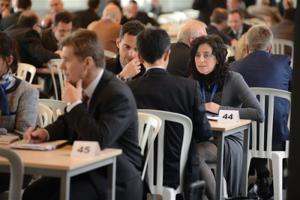Soren Bang Kors, ITER ILO in Denmark (Clip 1, 4ʹ08"): "[ITER] is not just any other business opportunity. There'll be both conventional deliveries but also very high tech, very specialized technologies required—technologies that are on the brink of what is possible today. The first major challenge for SMEs and industry in general to get involved in a project like ITER is that they should be able to see themselves and their competencies as being relevant to ITER."
Christian Dierick, ILO in Belgium (Clip 1, 5ʹ00"): "It's not only an [opportunity] for big players in the field; on a second-tier level—contracting—there are also possibilities. We have many technical companies which have niche competencies and which have to find their place ..."
Paolo Bonifazi, Business Development Manager at Walter Tosto, Italy (Clip 2, 1ʹ42"): "Let me say that ITER was for us like a [rocket booster] because I think that we reached the level of know-how and the level of capability in a very, very short time."
Michael Peiniger, Managing Director of Research Instruments, UK (Clip 2, 0ʹ42"): "ITER technical requirements are really very, very demanding, cutting-edge ... as a cutting-edge company it is still very challenging for us. We are excited to get to this level of technology ... and to get into a new business area."
Maria Teresa Dominguez, Director of Advanced Projects at Empresarios Agrupados, Spain (Clip 2, 3ʹ18"): "Having been involved in ITER we have had the opportunity to work in consortiums with international companies, and work with SMEs. For us, it was not the case before. We are able to work with the young generation, and transfer our nuclear experience to the young generation. There are a lot of benefits to our being involved in the ITER Project."
Henrik Bindslev, Director of the European Domestic Energy, F4E (Clip 1, 0ʹ47"): "In ITER, we are creating something that is absolutely unique. It's hugely challenging and it hasn't been done before. This, of course, means that we're going to be pressing technology to the limit of what we know today. In fact, we're going to be inventing new technologies and much of this invention will take place in industry, but also in partnerships with other high-tech technology areas such as companies and in public research organizations. So our expectation is that SMEs, which are where much of the innovation takes place in society, will ... help us address this very challenging, very difficult task of making fusion a reality, but also be part of improving the competitiveness of our economy, of ensuring job creation..."
View the video clips on the European Domestic Agency website.


